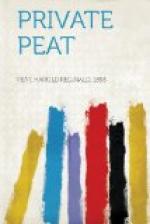Each soldier carries into the trenches with him sufficient coke and wood to last for his four days in. Upon the brazier he cooks his own meals. For the first few months we were unable to place our braziers on the ground; they would have sunk into the mud. If we attempted to cook anything we would stick a bayonet into a sandbag and hang the brazier on it, then cook in our mess tins over that.
To-day there are dugouts, trench platforms and other conveniences which simplify the domestic arrangements of the trenches to a marvelous degree.
A soldier is at liberty to cook his own rations by himself, but as a rule we all chum in together. We may all take a hand in the cooking, or we may appoint a section cook for a day or for a week, according to his especial facility.
After the rum ration we receive some tea and sugar, lots of bully beef and biscuits. The bully beef is corned beef and has its origin, mysterious to us, in Chicago, Illinois, or so we believe. It is quite good. But you can get too much of a good thing once too often. So sometimes we eat it, and sometimes we use the unopened tins as bricks and line the trenches with them. Good solid bricks, too! We get soup powders and yet more soup powders. We get cheese that is not cream cheese, and we get a slice of raw bacon. Often we eat the bacon at once, sometimes we save it up to have a “good feed” at one time. One can plan one’s own menu just as fancy dictates.
Then we get jam. The inevitable, haunting, horrific “plum and apple.” This is made by Ticklers’, Limited, of London, England, and after the tins are empty we use them to manufacture hand grenades. In those days our supply of hand bombs was like our supply of shells, problematic to say the least. After a time, back of the line, instruction schools were opened in bomb making and bomb throwing. One or two out of a platoon would go back and learn “how,” and then instruct the rest of us to fill the tins with spent pieces of shrapnel, old scraps of iron, anything which came handy, insert the fuse, cotton and so forth, and thus form an effective weapon for close fighting.
We called those bombers “Ticklers’ Artillery Brigade,” and they tickled many a German with Ticklers’ empty jam tins.
A stock of weak tea, some sugar, salt, some bully beef, biscuits crumbled down, the whole well stirred and brought to a boil, then thickened by several soup powders, is a recipe for a stew which, as the Irishman said, is “filling and feeding.” Of its appearance I say nothing.
Regardless of any, we are the best fed troops in the field. While in the trenches the food may be rough and monotonous, but there is plenty of it, and it is of the best quality of its kind. No man need ever be hungry in the trenches. It is his own fault if he is.
We grouse at our rations, of course, and make jokes and laugh, but we never run short of supplies.
Behind the lines, when we go back for a rest and are in billets, we are supplied with well-cooked and comfortable meals. Three good squares a day. We have here our field kitchens and our regular cooks, and Mulligan (stew) is not the daily portion, but variations of roast beef, mutton and so forth.




